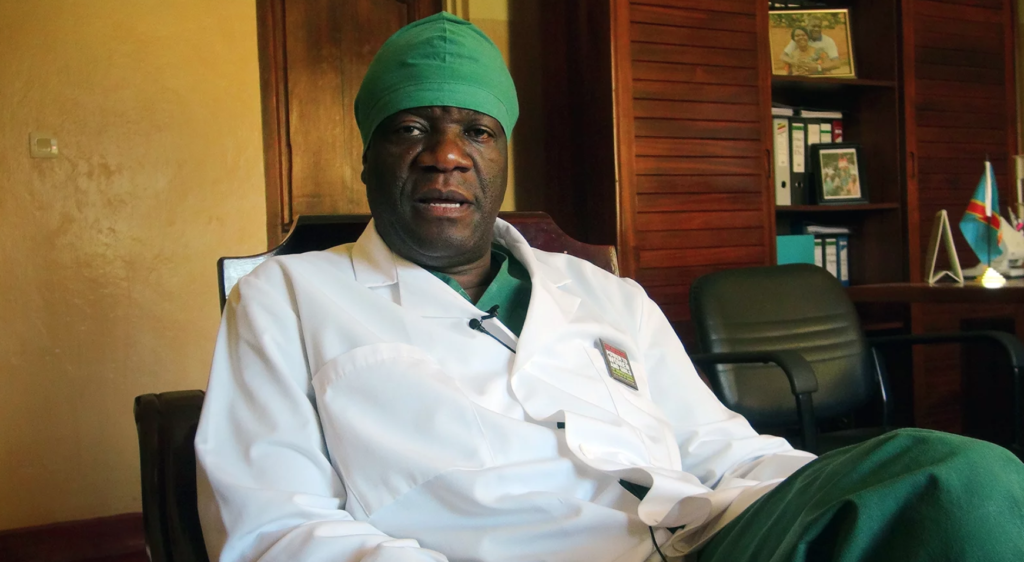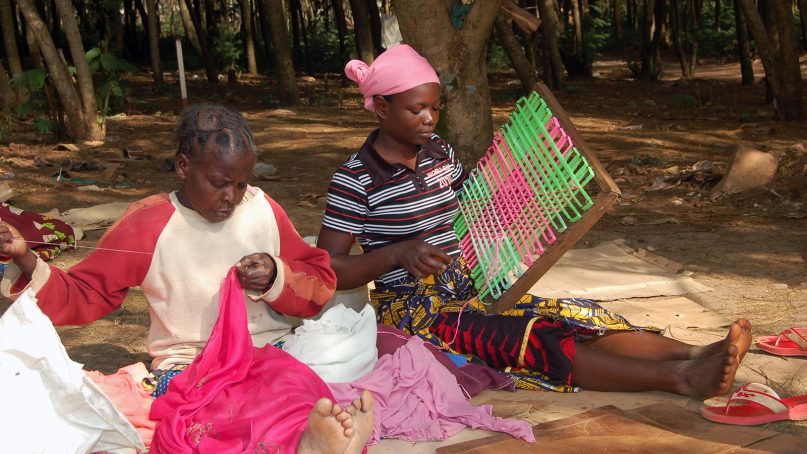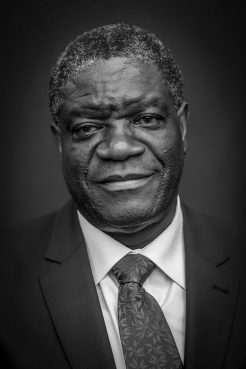
Congolese gynecologist and Nobel Peace Prize winner Dr. Denis Mukwege, in his office at Panzi Hospital on Feb. 6, 2013, in eastern Congo. Photo by PINAULT/VOA/Creative Commons
NAIROBI, Kenya (RNS) — At a tender age, Denis Mukwege accompanied his father, a Pentecostal church pastor, as he moved around the villages of Congo’s South Kivu Province praying for sick parishioners.
Those experiences inspired Mukwege to become a doctor — and later to found Panzi Hospital, a church-run facility in Bukavu, a community in eastern Congo. There, Mukwege has become known as the doctor who heals women suffering horrific damages after rape.
On Oct. 5, Mukwege and Nadia Murad, a young Iraqi human rights activist, won the 2018 Nobel Peace Prize for their efforts to end the use of sexual violence as a weapon of war and armed conflict in their countries.
The 63-year-old gynecologist, a Pentecostal Christian, is the medical director at Panzi Hospital, where for two decades he has treated thousands of women and girls badly mutilated after being subjected to rape.
In eastern Congo, armed men have been using rape as a weapon of war in a prolonged conflict largely centered on the control of mineral wealth. The region is rich in tantalum, a rare earth metal, along with tungsten and gold.
“I think they want to destroy the community. They rape in the presence of family members and the villagers,” Mukwege told this writer in an interview at Panzi Hospital at the peak of the violence in 2009.
“I feel bad when I see children, the same age as mine, have been raped, and they have been destroyed. They have no rectum, no sex organs, and this has been done by men who just want to destroy. This affects me as a person.”
But at the hospital, survivors of sexual violence have been finding help.
The doctor has been performing reconstructive surgery, giving them a new lease of life. And when they leave the hospital, the women are also emotionally and mentally empowered, apart from receiving financial and educational support to help rebuild their lives.
Since its founding, the hospital has treated more than 85,000 women and girls with complex gynecological injuries. More than 50,000 are survivors of sexual violence.

Rape survivors learn practical skills while recovering at Panzi Hospital in Bukavu in eastern Congo in 2009. RNS photo by Fredrick Nzwili
The doctor has dedicated his award to women all over the world harmed by conflict and suffering violence every day.
“Indeed, this honor is an inspiration because it shows that the world is … paying attention to the tragedy of rape and sexual violence and that the women and children who have suffered far too long are not being ignored,” Mukwege said in a statement released soon after he learned of the prize. He was in the midst of a surgery when the announcement was made.
“This Nobel Prize reflects this recognition of the suffering and the need for just reparation for female victims of rape and sexual violence in countries across the world and all continents.”
According to the doctor, the Nobel Prize will have real meaning only if it helps mobilize people to change the situation for victims of armed conflict. For years, he has advocated for the reclassification of sexual assaults, gang rapes and sexual mutilations by soldiers as war crimes. He has taken this advocacy to the United Nations, the U.N. Security Council and other international organizations.
Since the beginning, his work has been inspired by his faith.

Dr. Denis Mukwege in November 2014. Photo © Claude Truong-Ngoc/Creative Commons
In 1999, he founded the Panzi Hospital with support from the Communauté des Eglises de Pentecôte en Afrique Centrale. CEPAC, which was founded in 1921 by Swedish Pentecostals, is one of the largest Pentecostal groups in Congo. The church manages the hospital.
Although the hospital’s main focus is to offer medical and psychological treatment to survivors of sexual violence, it runs other projects too, including a training for medical staff on repair of fistulas, an HIV and AIDS program and a nutrition one, among others.
In Congo, CEPAC has an estimated membership of about 800,000 in more than 700 congregations concentrated in the eastern parts. The church runs more than 1,000 schools and about 160 health centers and implements several humanitarian and development projects in the war-torn region.
“We (churches) see Dr. Mukwege as a true blessing and a gift from God to CEPAC and Congo,” the Rev. Mateso Muke, spokesman of the 8th Community of Pentecostal Churches in Central Africa, said in a telephone interview Thursday (Oct. 18). “It’s a rare commitment to be helping ordinary citizens badly affected by violence, especially women. He is a true patriot.
“The award has given a good image to CEPAC and its work. Through him Congo and Africa have got a true defender of peace,” added Muke.
Other churches in eastern Congo have welcomed news of Mukwege’s Nobel Prize, saying it will boost the war against sexual violence in the region.
“We are very happy,” Bishop Josue’ Bulambo Lembelembe of the Church of Christ in Congo said. “This is also great recognition for the work of the church.”
Roman Catholic Archbishop Marcel Utembi Tapa of Kisangani said the award was an encouragement to all to oppose any forms of violence against women.
“The criminal use of rape as a weapon of war is a serious violation of life and respect for all human beings, especially women,” said Utembi.
